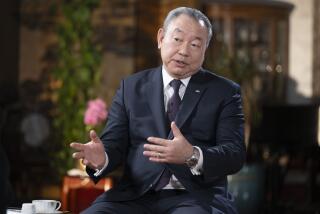Taiwan Calls for Detente With China
- Share via
TAIPEI, Taiwan — Bolstered by a clear mandate the day after winning Taiwan’s first fully democratic election, the new government said Sunday that it is willing to resume talks with China but that the next step toward reconciliation is up to Beijing.
“We should pursue a policy of detente . . . based on the principles of equality and goodwill,” Taiwanese Prime Minister Lien Chan said. “The most important thing is to work together with China to abandon the zero-sum mentality.”
Lien said the administration of President Lee Teng-hui, who won resounding reelection in Saturday’s vote, is “seriously” considering a peace agreement with China and wants to prepare the way for a bilateral summit.
Chinese officials also floated the idea of talks with Taiwan.
“The two sides should realize a high-level summit between their leaders,” Chinese Foreign Ministry spokesman Shen Guofang told Reuters news service.
But Shen also signaled that Beijing won’t be the first to come to the negotiating table.
“The doors have been opened [by China]. The obstacles today lie with the Taiwan authorities,” he told Hong Kong’s Beijing-backed Wen Wei Po newspaper.
Three-quarters of Taiwan’s voters on Saturday showed their support either for Lee’s program to solidify Taiwan’s sovereignty or for the outright independence advocated by the second-place finisher--a result seen here as a defiant retort to Beijing’s attempts to coerce pro-China votes.
In recent weeks, China has stepped up verbal and military pressure on Taiwan, including missile tests and live-fire war maneuvers close to the island, to try to persuade voters to shun notions of independence. It regards Taiwan as a renegade province.
Lee’s popular backing--plus the presence of the largest U.S. naval armada in nearby waters since the Vietnam War and two U.S. congressional resolutions declaring support for Taiwan--gives the president the confidence to wait for Beijing to make the next move, his advisors say.
“My aim is to pursue national dignity and establish our place in the world,” Lee said at a celebration for Taiwanese citizens who had returned home from overseas just for the elections. “There’s no turning back on our road to democracy,” he told the crowd before leading a round of Taiwanese songs.
China and Taiwan usually communicate through nongovernmental groups to discuss trade and technical issues. Talks about establishing direct air, shipping and transport links were suspended in June after Lee made a “private” visit to Cornell University in upstate New York. China interpreted the trip, which included meetings with members of Congress, as a gambit aimed at independence.
A senior official in one of the cross-straits organizations said that unprecedented government-to-government talks could take place on the sidelines of a forum for international leaders. He added that Taiwan might also consider putting aside its bid for U.N. membership, part of the territory’s aggressive, multimillion-dollar push to raise its world profile.
“Before the crisis, the government put foreign relations above cross-straits relations,” this official said. “But now relations with China will become first priority.”
After months of vilifying Lee as “a liar,” “a traitor to the Chinese people” and “the sinner of all millennia,” it will be difficult for China’s leaders to approach Taiwan, said China scholar Steve Goldstein, an American who came to Taipei to observe the elections.
There will be much finger-pointing between the military and political leadership, he said, to assign blame for the apparent backfire of Beijing’s intimidation.
“Someone is in real trouble--either [Chinese President] Jiang Zemin or the generals [behind the campaign],” said Goldstein. “This failure is a real blow at a time of political transition.”
It may fall to the United States to play peacemaker in the China-Taiwan conflict, perhaps at a meeting between Secretary of State Warren Christopher and Chinese Foreign Minister Qian Qichen next month at The Hague.
But so far, the U.S. presence in the region has been controversial.
Shen said Saturday that the dispatch of two U.S. battle groups into waters around Taiwan sent a signal to Taipei that Washington supports pro-independence activities on the island.
“On the Taiwan problem, we believe the U.S. government has hurt the feelings of the Chinese people,” Shen said. “If the United States . . . is flaunting its military force, it is a very unwise policy.”
Market analysts, meanwhile, believe Taiwan’s sagging financial markets--a casualty of China’s military threats--will rebound because of Lee’s strong showing.
The government has spent hundreds of millions of dollars to prop up Taiwan’s currency and stock prices since China began war games two weeks ago.
Despite the intervention, the Taipei stock market has fallen 4% this year. On Saturday, a newspaper quoted official figures that investors have pulled $5 billion out of Taiwan.
But Lee’s election by an unexpectedly wide margin (he garnered 54% of the vote) should restore investor confidence in Taiwan, market watchers said Sunday.
“The stock market is poised to rally Monday in celebration of Lee’s resounding victory,” said Tu Jin-lung, vice president of Grand Cathay Securities Corp.
More to Read
Sign up for Essential California
The most important California stories and recommendations in your inbox every morning.
You may occasionally receive promotional content from the Los Angeles Times.










